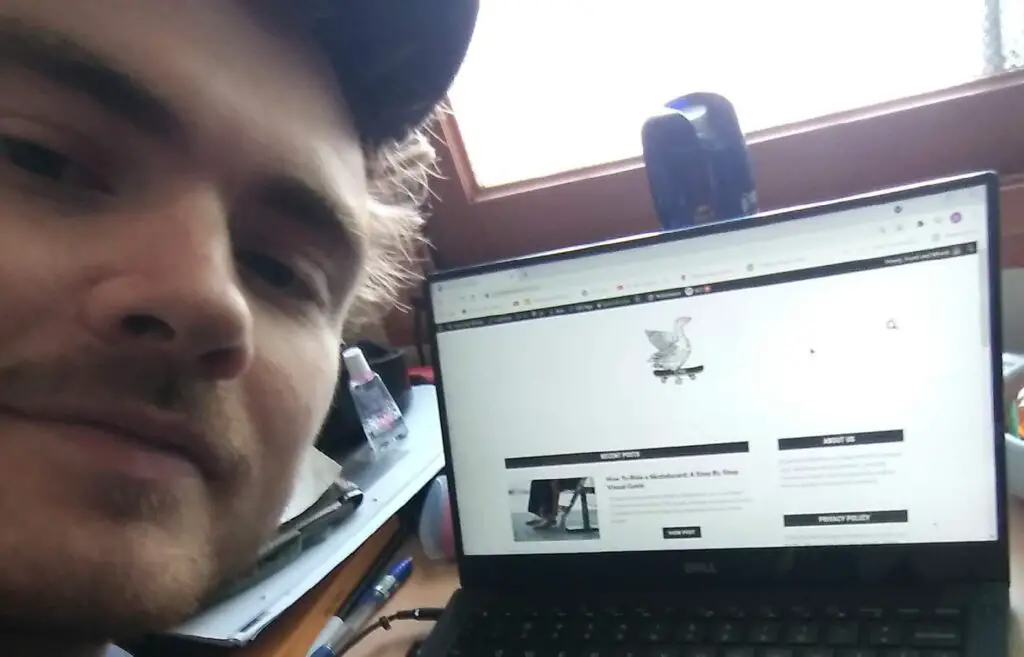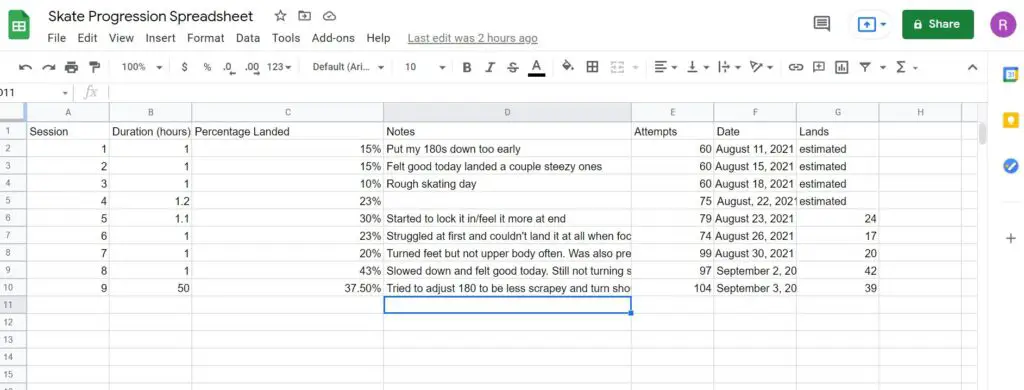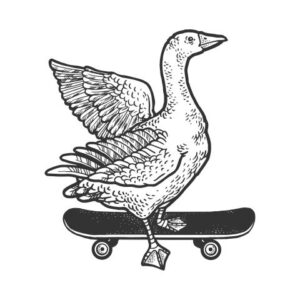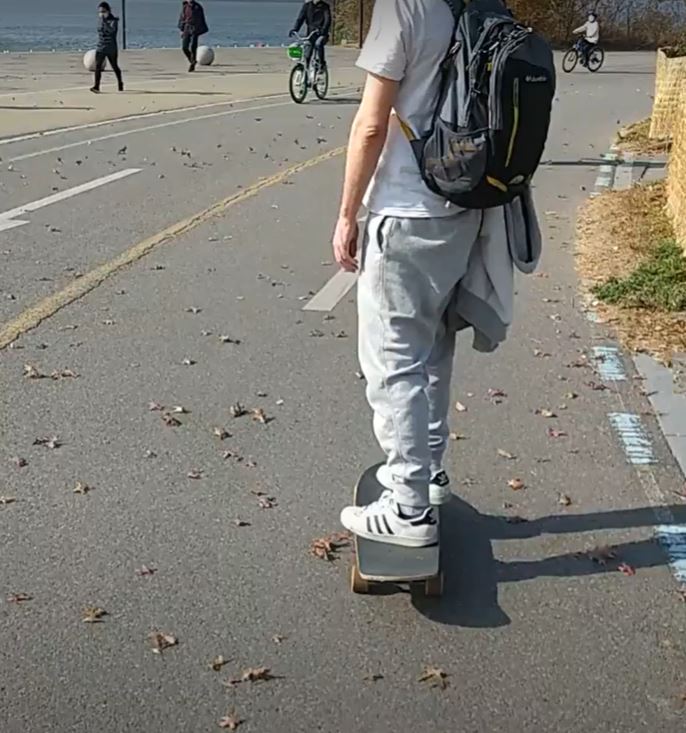Not everyone has the option to skate with others. Maybe you live in a rural area or a country where skating is not so popular. Or maybe you just prefer and are more comfortable with skating alone.
Regardless of the reason, this simple guide will get you started on teaching yourself to skateboard.
Personally, I mostly skate alone. Currently, I’m abroad in a country where the native language isn’t English, and I usually only have time to skate in the mornings. Due to this, I’m often out there skating solo with my coffee and enjoying the morning. I kind of love it. The solitude and simplicity of just focusing on landing a trick is a great way to relax.
Anyway, I have quite a bit of experience teaching myself to skate and wanted to make a simple guide with tips for others doing the same.
So let’s get started with the solo skater’s guide to teaching yourself skateboarding.
Can You Teach Yourself to Skateboard?
We are lucky to live in a time where we can access incredible amounts of information through our phone or computer (or TV or game console). If we want to learn something new, we simply need to type it into Google and get started.
It has never been easier to teach yourself to skateboard. There are incredible and clear guides available on YouTube and various blogs across the web. There are also many online skateboarding communities where you can post videos of yourself and ask for tips. Just because you are learning skateboarding alone doesn’t mean that you cannot progress quickly.
Seriously, it is incredible how clear and instructive some skate tutorials are online. Braille Skateboarding does a great job with this and even I publish some simple guides on like How to Ollie Straight for example.
In the 90s and early 2000s, these resources simply didn’t exist and people who were passionate enough still managed to learn to skateboard. We have everything we need to teach and learn on our own.
Advantages and Disadvantages of Learning Skateboarding Solo
Otherwise, learning skateboarding on your own has some disadvantages and advantages. One advantage is that you will feel no pressure to skate different tricks or in any other style that you want to. You can go also go at your own pace and skate whenever you have time without worrying about others.
Some disadvantages include not being able to get tips and help from other skaters and missing out on the social aspect of skating. It is much easier to motivate yourself to get out to go skate often when really you’re just meeting up with your friends.
Most skaters do a mix of social and solo skating. Solo skate sessions are kind of perfect for focusing on a particular trick and relaxing with music. So really, there is nothing stopping you from learning to skate by yourself. It’s just a little different experience than learning with others.
How to Teach Yourself to Skateboard
1. Read and Watch Skateboard Tutorials
Sometimes I dream about skateboarding. In my dreams, I usually have amazing board control and can land the tricks I want to do smoothly and clean. I always wake up excited to try the tricks again, but I never land them like I do in my dream.
Dreaming about a trick doesn’t help me understand how to position my feet, flick the board, and turn my shoulders, but an online guide does.
Skating alone means that you can’t just ask your friend for help on how to kickflip. You need to use a video or written guide to learn how. This actually can be a good thing because oftentimes, other skaters aren’t the best teachers. Even though you can do the trick yourself, knowing how to teach it is a different skill.
If you are a complete beginner I recommend checking out my beginner’s guide on how to skateboard that goes over step by step how to start riding your skateboard.

ACTION STEP: Spend 1 hour today watching skateboarding introduction guides on YouTube. If you are not a complete beginner, spend an hour watching guides on the trick your currently learning.
2. Focused Practice
If you really want to progress faster, then you want to use focused practice. This refers to focusing your skating time on one trick or line if you’re experienced, and maybe something like pushing off if you’re a complete beginner.
You should focus on something that you haven’t mastered yet, and is still challenging. Then you should simply try the trick or motion again and again and again. This can be repetitive and boring for some people, but it’s how you learn. You need to put in the hours focusing on practicing a single trick or motion if you want to learn it well.
You won’t learn to kickflip by trying one kickflip every other day. You need to grind out hundreds of attempts before you land your first kickflip. Then you need to do hundreds more to get your kickflip consistent.

ACTION STEP: Go skate for at least an hour today and focus on a specific trick or aspect of skating such as turning if you’re a beginner. Spend most of your practice working on that one trick or aspect of skating.
3. Practice Often
This step could go without saying some I will keep it short. The more time you put into practicing a skill, the better you will be and the quicker you will progress. Thinking about it won’t help you get better. Doing it will help you get better.
Sometimes practicing often is hard to do if you have a busy schedule like most adults do, but you can always make time. Just be realistic with yourself about what you can do and the results that you expect. Don’t expect to be doing tre flips over stairs anytime soon if you can only skate once a week.
ACTION STEP: Go skate for at least an hour today and make plans to go skate two more times this week. Try and practice at least three times a week if you want to progress.
4. Video Yourself
This tip is incredibly underrated and sometimes I think beginners are way too shy about it.
You should absolutely be taking videos of yourself skating even as a complete beginner. One of the joys of skateboarding is making awesome visual content such as videos and pictures. Also, you can really appreciate looking back at how much you’ve progressed over time.
If you are skating alone, then it is especially important to video yourself. This is because you can get a third-person perspective of yourself skating. This allows you to really see where you are messing up or making simple mistakes that you might be unaware of.
ACTION STEP: Prop up your phone or use a tripod to take a video of you doing a trick or riding your skateboard. Even if you can’t land the trick or you fall, still take a video.
5. Post a Video of Yourself and Ask For Advice
This is a way to get around one of the issues with learning to skateboard alone. You can’t ask for tips if you’re confused about something. There just isn’t anyone to ask.
Thankfully, you took a video of yourself in the last step! Now, not only are there many online guides and tutorials, there are also loads of online skateboarding communities on Reddit, Facebook, Discord, Tiktok, and pretty much everywhere else.
You can now probe the collective of all the skaters in these communities simply by joining and posting! This is a great alternative if you are stuck with a trick while teaching yourself and need an outside opinion.
Plus, it gets you interacting with other skaters at least over messaging if not in real life. This is at least some sort of start to making skating friends.
ACTION STEP: Join an online skateboarding community. It can be Reddit’s /r/NewSkaters community or a Facebook group. Post a video of you doing a trick and ask for advice or pointers.
Professional Skaters Who Started By Teaching Themselves
Alexis Sablone
Alexis Sablone was a skater out of a small town near Boston. She started skating alone in her garage in the 90s as no one in her immediate area skated. She started by imitating videos she had and trying to land their tricks. There was no YouTube at this time.
Some time after starting by learning alone, she got involved in the Boston skate scene and began skating with others.
Either way, the point is that Alexis Sablone started by teaching herself to skate with very little resources and she recently placed 4th at the 2021 Tokyo Olympics for street skating. She also has some pretty sick skate parts in famous videos such as PJ Ladd’s Wonderful, Horrible Life.
If you’re interested in learning more about Alexis Sablone, then check out my full write-up about her here.
Rodney Mullen
Rodney Mullen is the most influential skateboarder to this day and is probably the ultimate GOAT in skateboarding. He has made many, many innovative skateboarding tricks and revolutionized street and freestyle skateboarding. However, when he started in Florida in the 70s, he mostly skated alone.
He would practice in his garage alone for hours and occasionally hang out with his sister’s surfer friends who would skate on the weekdays. He had no YouTube guides and no Braille Skateboarding, yet managed to become an elite skater at an early age.
To this day, he has the most successful freestyle competition run in the history of the sport, was part of the elite Bones Brigade, and is widely considered the most influential skater of all time.
If Rodney could successfully teach himself skateboarding in his garage, then you can too.
What is the Best Online Resource To Learn Skateboarding?
This is somewhat an opinion-based question, but I’ll give a list of the best and most popular online resources to learn skateboarding. Usually, though, most people learn from many different sources and not just one.
- Braille Skateboarding
- Board and Wheels Guides (my website 🙂 )
- Jonny Giger (or any other YouTube skater)
- WikiHow
- Skate Deluxe
- Surfer Today
Most of the resources are pretty solid. I think the Surfer today and Skate Deluxe resources aren’t the best because they only have static images and no videos or gifs of the motion which is pretty necessary for learning skateboarding. You need to see what you’re supposed to be doing.
This list is far from comprehensive. There are tons of pro skaters with how-to videos on YouTube which are usually pretty good. Though, there is also an insane number of videos and articles out there that are complete trash and unhelpful. So be warned.
If you are an adult skater just getting started, check out my adult beginner’s guide with a reality check here.
Conclusion
So there you have it. Teaching yourself to skateboard has never been easier and there have never been so many readily available online tutorials and communities.
There is no excuse and even some amazing pro-skaters started by learning to skate by themselves. You can do it. You’re awesome and also you will start to make skater friends naturally through skating. Very few people start with friends who skate. Usually, you need to show up and put in time skating before you make these friends.
So I hope this guide helped you and that you get started today. Life is short. Make the most of your time and go skate.
Anyway, thanks for reading, and look out for more articles from Board and Wheels.


